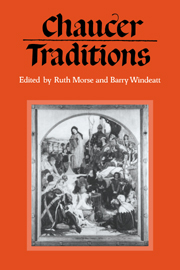Book contents
- Frontmatter
- Contents
- List of contributors
- Preface
- Note on the text
- 1 Chaucer traditions
- 2 Gower–Chaucer's heir?
- 3 Chaucer and Lydgate
- 4 Hoccleve and Chaucer
- 5 Chaucer and fifteenth-century romance: Partonope of Blois
- 6 Some Chaucerian themes in Scottish writers
- 7 The planetary gods in Chaucer and Henryson
- 8 Gavin Douglas: ‘Off Eloquence the flowand balmy strand’
- 9 Skelton's Garlande of Laurell and the Chaucerian tradition
- 10 Chaucerian metre and early Tudor songs
- 11 Aspects of the Chaucerian apocrypha: animadversions on William Thynne's edition of the Plowman's Tale
- 12 The shape-shiftings of the Wife of Bath, 1395–1670
- 13 The genius to improve an invention: transformations of the Knight's Tale
- 14 From the Clerk's Tale to The Winter's Tale
- 15 The Virtuoso's Troilus
- 16 Rewriting romance: Chaucer's and Dryden's Wife of Bath's Tale
- 17 Chaucer's religion and the Chaucer religion
- 18 A list of the published writings of Derek Brewer
- Index
10 - Chaucerian metre and early Tudor songs
Published online by Cambridge University Press: 23 September 2009
- Frontmatter
- Contents
- List of contributors
- Preface
- Note on the text
- 1 Chaucer traditions
- 2 Gower–Chaucer's heir?
- 3 Chaucer and Lydgate
- 4 Hoccleve and Chaucer
- 5 Chaucer and fifteenth-century romance: Partonope of Blois
- 6 Some Chaucerian themes in Scottish writers
- 7 The planetary gods in Chaucer and Henryson
- 8 Gavin Douglas: ‘Off Eloquence the flowand balmy strand’
- 9 Skelton's Garlande of Laurell and the Chaucerian tradition
- 10 Chaucerian metre and early Tudor songs
- 11 Aspects of the Chaucerian apocrypha: animadversions on William Thynne's edition of the Plowman's Tale
- 12 The shape-shiftings of the Wife of Bath, 1395–1670
- 13 The genius to improve an invention: transformations of the Knight's Tale
- 14 From the Clerk's Tale to The Winter's Tale
- 15 The Virtuoso's Troilus
- 16 Rewriting romance: Chaucer's and Dryden's Wife of Bath's Tale
- 17 Chaucer's religion and the Chaucer religion
- 18 A list of the published writings of Derek Brewer
- Index
Summary
The Fayrfax Manuscript (c. 1505) is one of three major songbooks which contain virtually all that survives of English secular songs from the late fifteenth and early sixteenth centuries. It has several claims on the attention of anyone interested in the period: the repertory it presents seems to reflect not only some secular and ‘occasional’ tastes of Henry VII's court narrowly considered but also a wider world of traditional fifteenth-century pieties. There is one claim, however, of particular interest to students of literature – the way its composers set English words:
The novelty was to attend to the words of the poems they chose in such a way as to see them, and set them, as physical sound-objects of an individual kind… [This manuscript] is the earliest source in which one finds the careful and observant copying [in music] of English speech-sounds.
This new musical practice is, of course, of interest in itself, since it is one of the symptoms of a changing ‘aesthetic’. But it could also throw some light on a problem that needs all the light it can get – the rhythm of late fifteenth-century ‘Chaucerian’ verse.
In this essay I shall attempt to assess some of the evidence relating to verse-sound, and therefore possibly the spoken performance of verse, which the surviving musical settings seem to offer.
- Type
- Chapter
- Information
- Chaucer TraditionsStudies in Honour of Derek Brewer, pp. 139 - 154Publisher: Cambridge University PressPrint publication year: 1990



